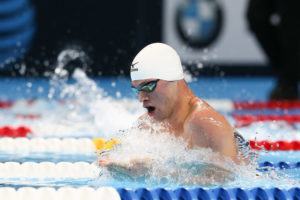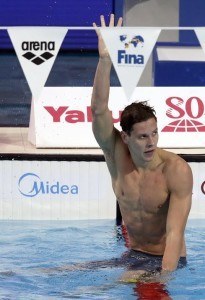Men’s 400m Medley Relay
- 2012 Olympic Champ: USA, 3:29.35
- 2015 World Champ: USA, 3:29.93
- World Record (2009): USA, 3:27.28
The U.S. has dominated many events in the world of swimming to varying degrees over the past number of years, but the 400 medley relay is the one that they absolutely own. They are undefeated on the Olympic stage (with Australia winning in 1980 due to the American boycott), and only once have they lost at the World Championships when they weren’t disqualified (1998). The Americans have been disqualified three times over the last eight World Championships, happening in 2001, 2007 and 2013. 2013 they initially won, 2007 they were DQed in prelims (though a win was all but certain), and 2001 they were actually beat for the only time in major championship history at the hands of the Australians before being disqualified anyway.
After pulling out the win in this event in Kazan by just fifteen one-hundredths, the Americans come in as the clear favorites despite last years close call. They will likely field the same team as they did last year other than flipping Tom Shields for Michael Phelps on fly, which is an upgrade. On top of that, Ryan Murphy, Kevin Cordes and Nathan Adrian all appear to be on better form than they were a year ago, specifically Murphy and Adrian who could easily be a full second faster on their splits this year than they were last. Murphy had a pair of 52.2s at Trials, well under his 53.05 opening leg last year. Adrian, who

Kevin Cordes, who false-started at the 2013 Worlds, will be a key leg for the Americans.
split 47.41 while almost being run down by Australia’s Cameron McEvoy, recently split 46.8 at a USA camp practice and appears to be on the best form of his life.
The reality is, the US has so much depth in each stroke that their prelim relay could easily contend for gold. David Plummer (52.12) and Cody Miller (59.09) both posted personal best times in the semi-finals at Trials, times that would’ve won in the final, yet were a bit slower in the final and finished 2nd. If they out-swim Murphy and Cordes in the individual event, they’ll likely get the nod in the final. If they’re firing on all cylinders, no matter who’s in the lineup, the U.S. shouldn’t have a problem winning again.

Mitch Larkin, co-favorite in both backstroke events in Rio, will give the Australians a great opening leg in their quest to take down the Americans (Alberto Estevez).
Their main threat will be the Australians, who, as mentioned before, almost topped them for gold last year. They are led by backstroker Mitch Larkin and Cameron McEvoy on freestyle, both of whom could easily come away with gold in their respective 100m races. Freestyle is the one area where the Aussies have a clear advantage over the US, with McEvoy being the fastest man in the world by nearly seven tenths of a second. It’s fair to say Larkin and Murphy are currently on equal terms for backstroke, while the advantage goes to the US (considerably) in breast and fly, giving them the edge. Unless Jake Packard on breast and David Morgan or Grant Irvine on fly swim around a second under their best times, McEvoy won’t have enough room to run down Adrian.
Last year in Kazan it wasn’t just a close race for first, it was a close race in general. Teams three through six (France, Great Britain, Russia and Japan) all finished within six tenths of each other and sixth place Japan was just 1.02 seconds off of the silver medal winning Australians.
France is a dangerous team after winning bronze last year, with all-around solid legs minus breaststroke. They have multiple combinations to chose from on fly and free, one of which is Jeremy Stravius on either who has proven to be a clutch relay performer and Florent Manaudou on free (if he performs in the 400 free relay), which has to be a scary thought for the other teams vying for a medal. Another option is Mehdy Metella on fly, who split 50.39 last year. If their breaststroker, Theo Bussiere, isn’t well under his best time of 1:01.35 it will be lights out for France. But if he’s under a minute, they’re in the medal hunt.
Great Britain is the team with the biggest advantage in one single stroke, as Adam Peaty towers over the breaststroke field. Other than him, all of their legs are relatively average. If Chris Walker-Hebborn can get back under 53 in the lead-off leg and Peaty throws down another 57, being in the fight for the lead may give their fly and free swimmers (likely James Guy and Ben Proud or Duncan Scott) an edge coming home.
The Russians and the Japanese are both solid through all four legs, but Russia was dealt a blow with the loss of Vladimir Morozov (though his eligibility is still somewhat pending). That shouldn’t make too much of an impact though, as Andrey Grechin is a proven performer, so both teams will join France and Great Britain in the battle for bronze like they did last year. If any of those teams have one or two dynamite legs, they could challenge the Aussies for silver.
Those six teams look to be the best in the field, with the remaining spots in the final up for grabs for the rest. Germany and Poland were the other two finalists last year, but both could easily be taken out with all teams tightly bunched.
One team that is very dangerous is South Africa, which boasts the duo of Cameron van der Burgh and Chad Le Clos, who won silver and gold medals last year in Kazan in their respective 100m events. With Christopher Reid dropping a 53-low 100 back at SA Trials, they could easily be a surprise finalist and be in the thick of things up until the freestyle leg.

The South Africans are one team with a lot of firepower that could surprise in Rio. Photo Credit / Anesh Debiky/Swim SA
Other teams who could surprise include China and Hungary, with China possessing two elite legs with Xu Jiayu and Ning Zetao, and Hungary holding one of the top flyers in Laszlo Cseh. China is probably a lot more dangerous than many expect, with breaststroke and flyers entered at 59.9 and 51.2 in their individual swims.
Then there’s the host Brazilians, who could be hit or miss in this event. Execution on all four fronts could see them in the final, or they could just as easily miss out. It seemingly all comes down to their fly leg, where they’ll need one of two guys who are entered with 52-lows to go in the 51-low range to give them a chance.
The other teams in the lineup are Greece, Italy, Canada and Lithuania. Lithuania lacks the fly leg needed to contend, while the other three are all missing that sub-1:00 breaststroker that is required to be competitive in this race.
|
Place |
Country |
Best Time (Since 2012 Olympics) |
Predicted Time in Rio |
|
1 |
United States |
3:29.93 |
3:27.7 |
|
2 |
Australia |
3:30.08 |
3:29.5 |
|
3 |
Great Britain |
3:30.67 |
3:30.6 |
|
4 |
France |
3:30.50 |
3:30.8 |
|
5 |
China |
3:31.37 |
3:30.9 |
|
6 |
Japan |
3:31.10 |
3:31.1 |
|
7 |
Russia |
3:30.90 |
3:31.8 |
|
8 |
South Africa |
3:33.80 |
3:32.9 |

I am confused… MP joined and won 4×100 freestyle relay, but he does not join 4×100 medley relay ? how come ?
Should be Phelps swansong gold. So even if he doesn’t grab an individual gold, and I think he will in the 200IM if not all, then the relays will see him out in style!
Bold Prediction (if they make finals) RSA will be in second plce going into the freestyle leg. Will be interesting if they stick to their anchor or if they take a chance on Tandy
What if Adam Peaty split 56.9
Who made this prediction? Bronze for GB and France 4th … ? What kind of joke is this supposed to be? I doubt that France will even make the final. I think France and South Africa will miss the final and Germany + Brazil will make it. USA will win Gold ahead of Australia and China.
James Sutherland made this crazy prediction.
He must be francophile.
I can see South Africa pulling out a bronze, if they only had a solid freestyler
I Even think Team Usa with such Talent in each stroke can beat their own WR time from Rome 2009 . They have the best times assembled from Trails to do it since 2009 . JUST DO IT
My picks
USA
AUS
CHN